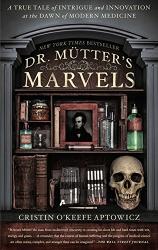Reading Group Guide
Discussion Questions
Dr. Mütter's Marvels: A True Tale of Intrigue and Innovation at the Dawn of Modern Medicine

1. What drew you to read this book?
2. Mutter dressed in an attention-grabbing, flamboyant way from a young age, despite his limited resources as an orphan ward. What do you think inspired this behavior, and why do you think he continued to do so his entire life?
3. Even after he was appointed Chair of Surgery at Jefferson Medical College, Mütter annoyed his peers with “his name-dropping, his flamboyant dress, his open frustration with those in his community who, he felt, failed to live up to the standard the medical profession demands” (p. 160). Would these habits still put him at a disadvantage today?
4. “While the other professors at Jefferson Medical College continued to give lectures traditionally --- a one way conversation with the students --- Mütter’s method was to actively engage with them…in an almost Socratic dialogue” (p. 89). Drawing from your own experience, compare a teacher or professor who lectured versus one who actively involved the class. Who did you learn more from and why?
5. What facts about 19th-century medicine surprised you the most while reading the book?
6. Aptowicz writes, “Many nineteenth-century physicians considered it a necessary part of their job to keep their patients in the dark about what exactly would be done to them during treatment” (p. 94). Can you think of any medical practices that happen today which might one day appear similarly barbaric by future generations?
7. Do people trust their doctors more now than they did in Mütter’s time?
8. It’s difficult to imagine from today’s perspective, but what choice would you make between living out the rest of your life as a “monster” or undergoing a lengthy operation without anesthesia? If the prospective patient was a close friend or loved one, what would you encourage him or her to do?
9. Conversely, do you think you could bring yourself to operate on a fully conscious patient?
10. How is it that Charles Meigs continued to enjoy a respected practice, even after incidents like his botched lecture featuring the etherized sheep, where his fiercely stated opinions seemed to be incorrect? Why is it important to remember people like Meigs?
11. “Unusual specimens --- or medical oddities, as they are sometimes called --- were always an attraction to the general public, and it seemed a cruel irony to Mütter that people who suffered so greatly during their life were also stripped of their rightful humanity after their death” (p. 282). Would you or have you already agreed to donate any part of your own physical remains after your death? If so, what do you consider acceptable use?
12. Some of the more devastating diseases and injuries disproportionately effected the poor and the working class populations in 19th-century Philadelphia. In what ways have these circumstances improved in the last 150 years, and in what ways have they stayed the same?
13. Aptowicz recounts the tragic death of Eliza Sowers, a young woman who suffered a gruesome and prolonged death after an illegal abortion went awry. Is it possible that we might head in that direction once again?
14. Had the author of this book been a man, would the plight of women during this era have been as rigorously documented?
15. Mütter had no close blood relations left in America, so what kept him in Philadelphia in the early days when he was struggling and towards the end of his life when it was clear that the weather was negatively affecting his health?
16. Have you ever been to The Mütter Museum? If so, has this changed how your viewed it? If not, did the book made you want to visit it?
17. If you could recommend DR. MÜTTER’S MARVELS to only one person, who would it be and why?
Dr. Mütter's Marvels: A True Tale of Intrigue and Innovation at the Dawn of Modern Medicine
- Publication Date: September 8, 2015
- Genres: Biography, History, Medicine, Nonfiction
- Paperback: 384 pages
- Publisher: Avery
- ISBN-10: 1592409253
- ISBN-13: 9781592409259








